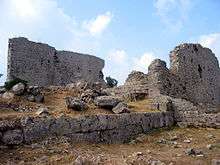Definify.com
Definition 2025
Cosa
Cosa
Latin
Etymology
From Etruscan 𐌂𐌖𐌔𐌉 (cusi) or 𐌂𐌏𐌔𐌉𐌀 (cosia).
Pronunciation
- (Classical) IPA(key): /ˈko.sa/, [ˈkɔ.sa]

The city's Capitolium
Proper noun
Cosa f (genitive Cosae); first declension
Declension
First declension.
| Case | Singular |
|---|---|
| nominative | Cosa |
| genitive | Cosae |
| dative | Cosae |
| accusative | Cosam |
| ablative | Cosā |
| vocative | Cosa |
Derived terms
- Cosānum
- Cosānus
References
- Félix Gaffiot (1934), “Cosa”, in Dictionnaire Illustré Latin-Français, Paris: Hachette.
- Cosa in William Smith., editor (1854, 1857) A Dictionary of Greek and Roman Geography, volume 1 & 2, London: Walton and Maberly
cosa
cosa
Aragonese
Noun
cosa f (plural cosas)
- thing (that which exists as a separate entity)
- 2010, Academia de l’Aragonés, Propuesta ortografica de l'Academia de l'Aragonés, 2nd edition, Edacar, page 67:
- Nombres propios d’animals, cosas y conceptos singularizaus: […]
- Proper names of animals, things and singularised concepts: […]
- Nombres propios d’animals, cosas y conceptos singularizaus: […]
- 2010, Academia de l’Aragonés, Propuesta ortografica de l'Academia de l'Aragonés, 2nd edition, Edacar, page 67:
Pronoun
cosa
- nothing (not any thing)
- May-August 2014, Fuellas, Consello d’a Fabla Aragonesa, page 26:
- Respondioron: muito 0,00 % / prou 33,3 % / poco 66,7 % / cosa 0,00 %
- They answered: a lot 0.00% / enough 33.3% / a little 66.7% / nothing 0.00%
- Respondioron: muito 0,00 % / prou 33,3 % / poco 66,7 % / cosa 0,00 %
- May-August 2014, Fuellas, Consello d’a Fabla Aragonesa, page 26:
Catalan
Etymology
Inherited from Latin causa. Cognate to the Catalan doublet causa, borrowed from the same source.
Noun
cosa f (plural coses)
Derived terms
Galician
Verb
cosa
- first-person singular present subjunctive of coser
- third-person singular present subjunctive of coser
Irish
Pronunciation
- IPA(key): [ˈkɔsˠə]
Noun
cosa f pl
Mutation
| Irish mutation | ||
|---|---|---|
| Radical | Lenition | Eclipsis |
| cosa | chosa | gcosa |
| Note: Some of these forms may be hypothetical. Not every possible mutated form of every word actually occurs. | ||
Italian
Etymology
Pronunciation
- (Northern Italy) IPA(key): /ˈkɔ.za/
- (Central and Southern Italy, standard) IPA(key): /ˈkɔ.sa/
Noun
cosa f (plural cose)
Pronoun
cosa
- what?
- what!
Derived terms
Anagrams
Old French
Noun
cosa f (oblique plural cosas, nominative singular cosa, nominative plural cosas)
- (very early Old French) Alternative form of chose
Usage notes
- Used in the Oaths of Strasbourg
Portuguese
Verb
cosa
- first-person singular present subjunctive of coser
- third-person singular present subjunctive of coser
- first-person singular imperative of coser
- third-person singular imperative of coser
Spanish
Etymology
From Latin causa. Cognates include French chose, Italian cosa, Portuguese coisa.
Pronunciation
- IPA(key): /ˈko.sa/
Noun
cosa f (plural cosas)
- thing (object, concept)
- (informal) thing (living being or creature)
- cosas hermosas — pretty [little] things
Usage notes
In some Latin American countries, the masculine form coso is used if the object being referred to is known to be that gender.
Verb
cosa